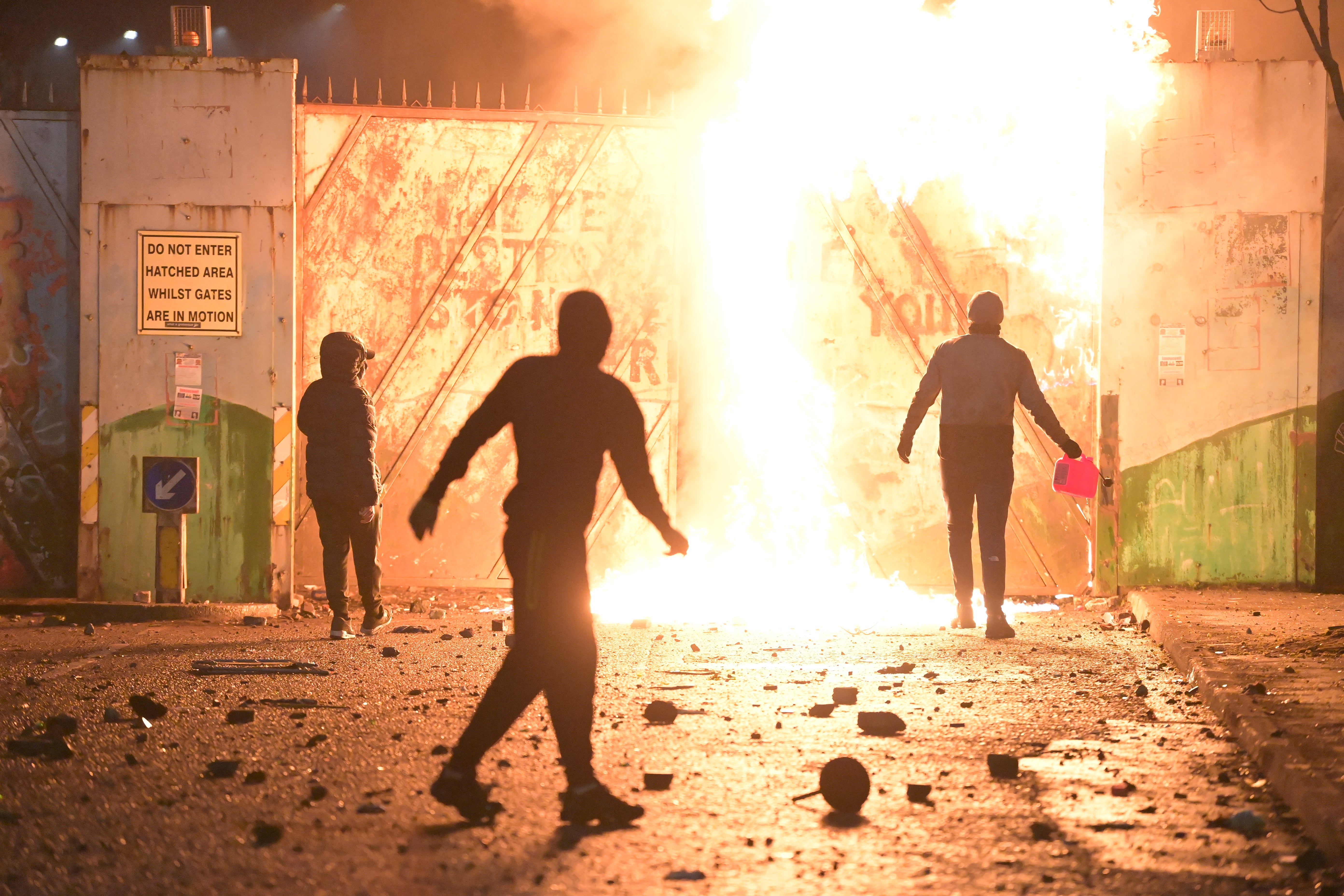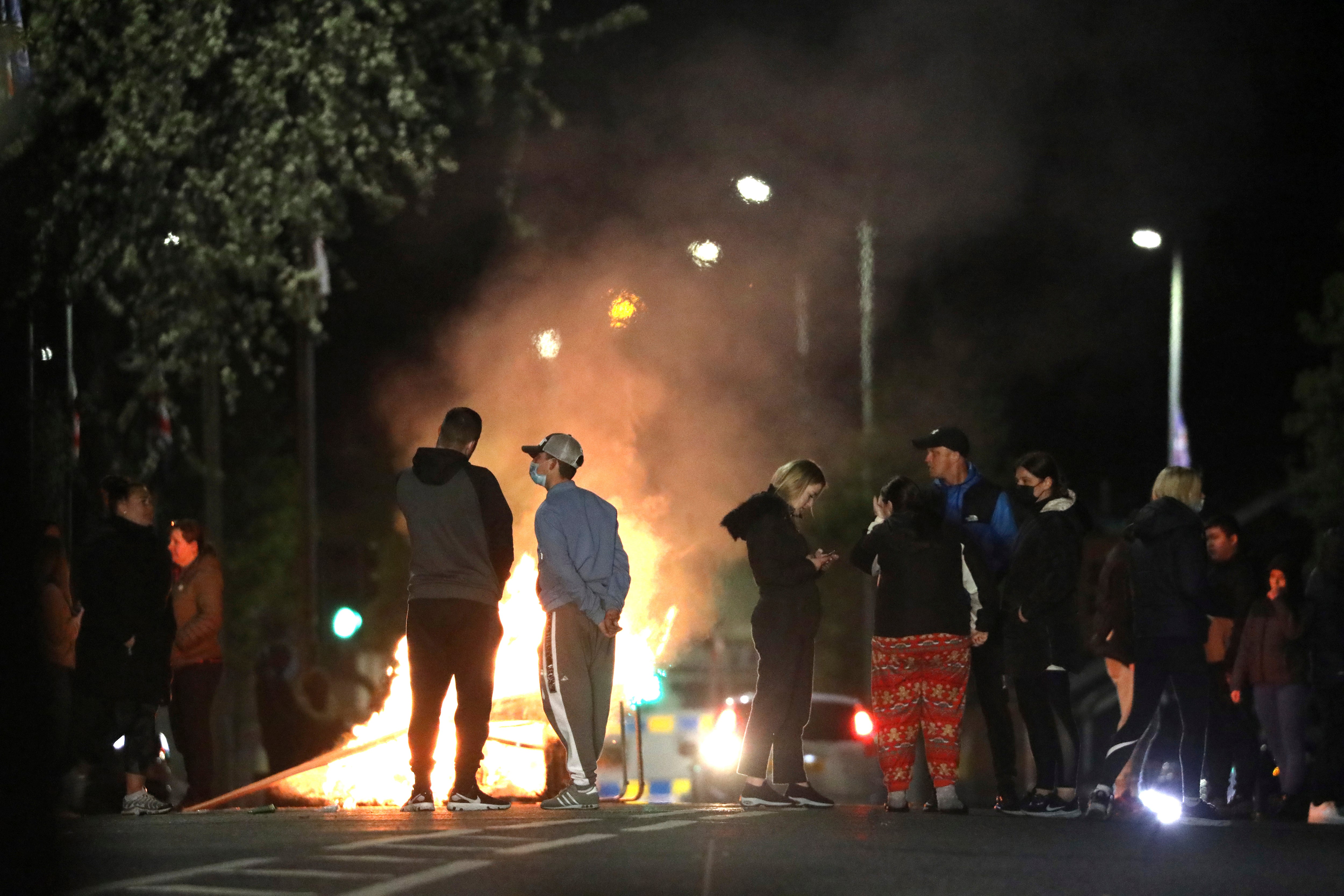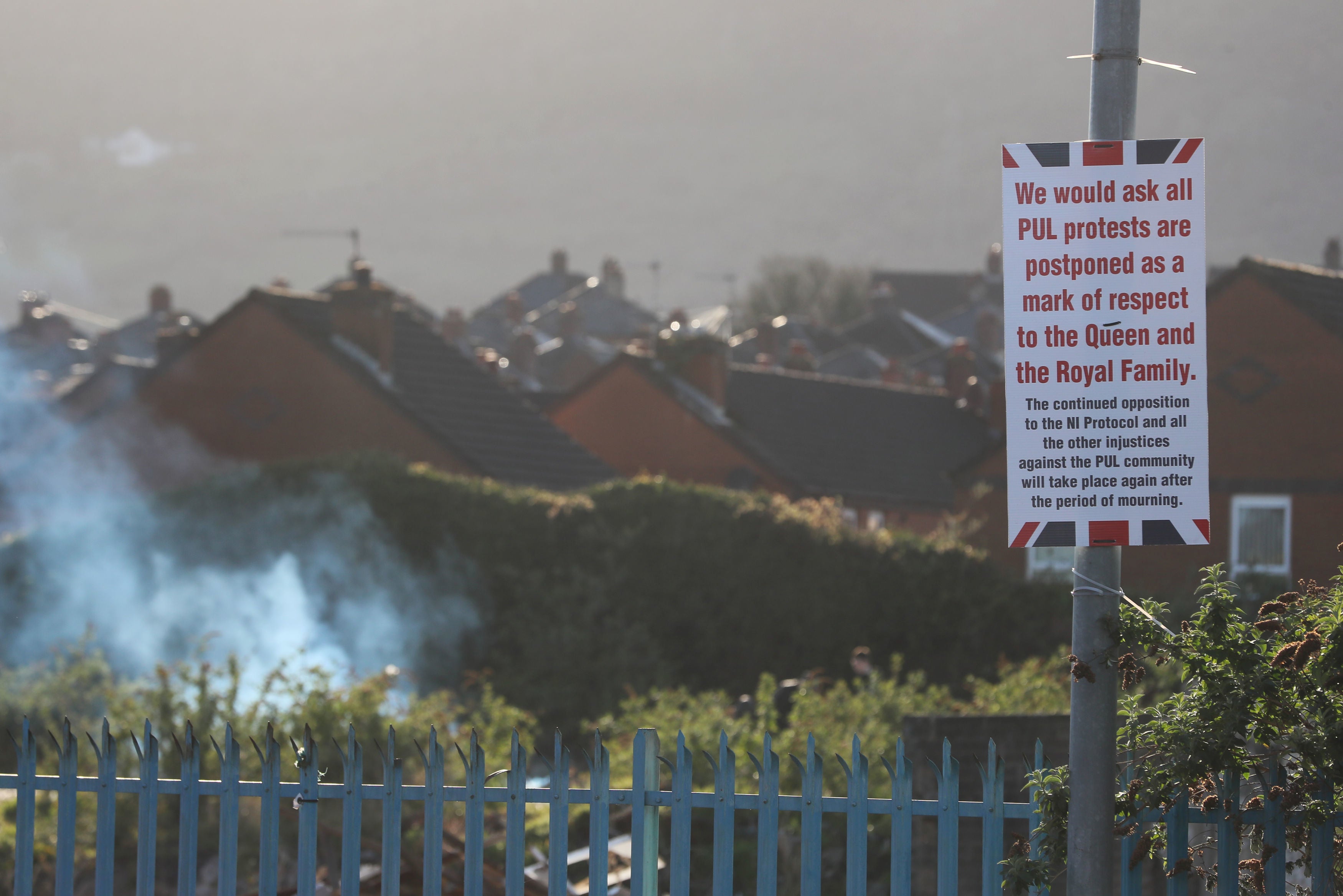‘The fear is much worse is coming’: Loyalist leaders call for political action as Northern Ireland violence returns
‘The young people feel that violence has paid off for the republicans, so why shouldn’t it pay off for them?’ hears Kim Sengupta in Belfast


“When your own prime minister shafts you, when he comes to this city and says there will be no border between us and Britain, and then breaks his word so easily, when your voice is being ignored, you feel abandoned,” said the loyalist community leader, a former paramilitary group member who had fought in the long years of Northern Ireland’s bitter conflict.
“The young people feel that violence has paid off for the republicans, so why shouldn’t it pay off for them? What is happening in the streets is not surprising. We have been warning this would happen – the fear is that there’s much worse in the coming months.”
The former combatant, who is connected with the Red Hand Commando, is among those on both sides of the divide who had fought against each other during the violence of the Troubles and had then laid down the gun, they wanted to stress, and worked to prevent strife since the Good Friday Agreement.
But the nights leading up to the anniversary of the historic 1998 deal, which ended 30 years of bombs, shootings and 3,700 deaths, brought back the grim spectre of the past, with riots in Belfast and elsewhere. Petrol bombs have been thrown, buses have been set alight and the police have used water cannons and rubber bullets and 88 officers have been injured.
One of the most worrying things, said the former paramilitary member, now aged 60, is that he and his colleagues are finding it difficult to control the aggression of the youths.
“This is on both sides. An IRA man, a veteran, was told, ‘f*** off grandad’, when he tried to intervene during some disturbances.

“We hear that kind of thing on our side as well, ex-combatants of 30 years, being told to f*** off. Now, I am sure that on both sides 50 or 60 people can be found who won’t f*** off and can enforce calm with baseball bats. But then that would be breaking the law and the same people demanding control in the community now will be demanding prosecutions. You’re damned if you do and you’re damned if you don’t.”
The scenes of violence in Belfast have made news internationally and raised alarm in the US, which under the Clinton administration helped broker the Good Friday Agreement. President Joe Biden has called for calm. Mr Johnson and the Irish Taoiseach Micheal Martin have also called for an end to the violence but there are no plans for the two governments to meet on the issue.
During a visit in August, Mr Johnson had reiterated that businesses would have unfettered access to markets in England, Scotland and Wales as they had always done. “There will be no border down the Irish Sea,” he declared, “that will happen over my dead body”.
There will be no border down the Irish Sea, that will happen over my dead body
Since then the Northern Ireland protocol has resulted in the establishing of a border down the Irish Sea and mounting costs for businesses in the region. David Campbell, a spokesman of the Loyalist Communities Council, an umbrella group which represents the Ulster Volunteer Force, Ulster Defence Association and Red Hand Commando, warned that lack of any political movement by the British and Irish governments in addressing the problem risks further violence and re-emergence of paramilitary action.
“We are perplexed and very disappointed by this lack of political initiatives; this is surely the time to act before things get even worse. We have seen nothing to show they understand how serious the situation has become here. The lack of a political path simply strengthens those among the paramilitaries who want to go back to the old ways again.

“The view among many people in the unionist community is that the government, basically, cannot see beyond middle England. We wonder if Boris Johnson fully understands what’s at stake here. On the other side we have had the Irish government constantly telling the EU that there will be violence if there is a hard border; that is seen by the loyalists as using the threat of violence to bargain. That has been a dangerous tactic and has certainly contributed to the anger among young loyalists.”
The former chair of the Ulster Unionist Party added: “We fully understand the concern of the nationalists that there should be no land border but the governments must understand the concern of unionist communities about a sea border.”
The community leaders presented a picture of a working-class unionist community which feels betrayed by the government in London and treated with condescension by Dublin, who feel that their identity is being eroded and are aggrieved by what they see as the police operating a two-tier system favouring the nationalist community over loyalists.
The level of violence in the streets has eased after demonstrations were suspended following the death of Prince Philip on Friday. Signs have been put up in west Belfast saying all PUL (protestant, unionist, loyalist) protests will be put off as a mark of respect to the royal family but, “the continued opposition to the NI Protocol and all the other injustices against the PUL community will take place again after the period of mourning”.
The catalyst for the riots was the decision by Northern Ireland’s Public Prosecution Service not to bring any charges against 24 Sinn Fein politicians who attended the funeral of Bobby Storey, a senior figure in the republican movement, in alleged breach of coronavirus guidelines.
Deputy first minister Michelle O’Neill and Gerry Adams, the former leader of the party, were among those who attended the funeral. The Northern Ireland Assembly passed a motion censuring Sinn Fein ministers for their attendance.
Northern Ireland’s first minister, Arlene Foster of the Democratic Unionist Party, has said police chief constable Simon Byrne’s position was now untenable and called for him to resign. Mr Byrne, who was born in England and has served in the Metropolitan Police, has refused to step down, insisting that no deal was done with funeral organisers. A report is being prepared into the handling of the funeral by Her Majesty’s Inspectorate of Constabularies and is expected to be published in May.
The annual marching season – the backdrop of regular sectarian confrontation in the past – will soon begin amid trepidation of what may follow. Some loyalist community leaders have warned that organisers may not liaise with the police because of “double standards” over the funeral. The Orange Order in Belfast is among those now reviewing their engagement with the police.
We have spent 20 years telling people to avoid any trouble during the marches, and the reward is seeing massive flouting of rules by the other side
“Some people will not bother to present the 11/1 (notification form for parades) this summer. We have spent 20 years telling people to avoid any trouble during the marches, and the reward is seeing massive flouting of rules by the other side”, said one former combatant.
“People may get angry and violence can start and they can start without organising. The police blamed the paramilitaries for starting the trouble, I am glad they have retracted that.”
Mark Lindsay, chairperson of the Police Federation for Northern Ireland, speaking about what unfolded, said: “It’s obvious that some people behind the violence, there was an element of control, whether it was by paramilitary groups, or criminal gangs claiming to be paramilitary groups. If it is criminal gangs then community leaders should use their influence, which we know they have, to prevent this sort of violence taking place again.”
Mr Lindsay said the police were fully aware of the potential for violence in the coming months.
“We need to prepare and avert what can be a very dangerous situation in which we can face widespread violence. We are facing issues with some communities who will organise parades and bonfires.
“We only have a limited amount of time to prepare for this, we want political and community leaders to engage with the police and work out a strategy of defusing the situation. We don’t want to be pitted against any community: we want to work with all the communities. We must avoid a situation where large numbers of people will come on to the streets to confront the police or confront each other: we can’t risk repeating some of the worst times from the past.”
Koulla Yiasouma, Northern Ireland’s Children’s Commissioner, has spoken of the urgent need to stop the manipulation of young people by those who have ulterior motives.
“The exploitation and coercion of vulnerable children needs to stop. Some communities remain fragile, they remain segregated, great work by community workers have ensured that there has been 20 years of peace, that shouldn’t be jeopardised”, she said.
Ms Yiasouma called on politicians in London to consider the effect on Northern Ireland of decisions being taken on the mainland. She said: “When you work on a protocol, when you decide on something like Brexit or any other policy that has an impact on Northern Ireland, talk to those communities and young people. These are our children’s lives and futures and they’re far too important to be playing about with in politics.”
A small group of young people who took part in the disturbances in Belfast agreed to talk about why they became involved. They expressed their discontent, at first hesitantly, about the authorities supposedly discriminating against Protestants, the political parties being “useless” at representing loyalists, as well as being forced into bad living conditions while people on the other side appeared to be getting richer.
All of them were born after the Good Friday Agreement was signed. Would they really want to return to the days of conflict? There were a few shrugs, then one of them, “Jim”, 17, said, “No one’s saying that. But we have to take care of our people if the government don’t care. Our families have done that in the past, we can do that again if we have to, sure we can.”
Join our commenting forum
Join thought-provoking conversations, follow other Independent readers and see their replies
Comments
Bookmark popover
Removed from bookmarks